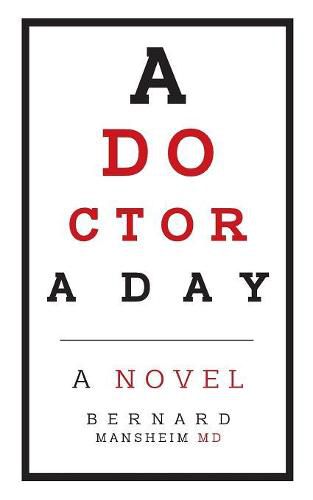Readings Newsletter
Become a Readings Member to make your shopping experience even easier.
Sign in or sign up for free!
You’re not far away from qualifying for FREE standard shipping within Australia
You’ve qualified for FREE standard shipping within Australia
The cart is loading…






This title is printed to order. This book may have been self-published. If so, we cannot guarantee the quality of the content. In the main most books will have gone through the editing process however some may not. We therefore suggest that you be aware of this before ordering this book. If in doubt check either the author or publisher’s details as we are unable to accept any returns unless they are faulty. Please contact us if you have any questions.
A Doctor a Day is a novel about one physician and the physical, emotional and psychological toll of his dedication. He’s a good doctor with ten years of unrelenting care for dying patients and their families. The pressure becomes unbearable when he is sued for malpractice, leading him to consider suicide as the only escape. Though the story is fictional, it reflects the all too common, real-life issues faced by practicing physicians in today’s world.
Why did I write this novel?
My major goal was to provide insight into the mind of a physician by following the main character, Dr. Luke James, through his tenth year of medical practice. You become privy to his challenges and fears, unmasking the psychological burden he endures. It serves as an example of what many of today’s physicians experience during their careers and how some can be driven to extremes.
In the real world, an air of medical infallibility is still the prerequisite to instilling patient confidence. This expectation presents an unrealistic, psychologically exhausting burden ultimately damaging to doctors and patients alike. It might help explain why the physician suicide rate is fifty percent greater than the general population. Even worse, the mental health support systems designed to help physicians are severely lacking.
This leads to the all-important question–especially critical given our continual demand for good medical care–Who heals our healers?
$9.00 standard shipping within Australia
FREE standard shipping within Australia for orders over $100.00
Express & International shipping calculated at checkout
This title is printed to order. This book may have been self-published. If so, we cannot guarantee the quality of the content. In the main most books will have gone through the editing process however some may not. We therefore suggest that you be aware of this before ordering this book. If in doubt check either the author or publisher’s details as we are unable to accept any returns unless they are faulty. Please contact us if you have any questions.
A Doctor a Day is a novel about one physician and the physical, emotional and psychological toll of his dedication. He’s a good doctor with ten years of unrelenting care for dying patients and their families. The pressure becomes unbearable when he is sued for malpractice, leading him to consider suicide as the only escape. Though the story is fictional, it reflects the all too common, real-life issues faced by practicing physicians in today’s world.
Why did I write this novel?
My major goal was to provide insight into the mind of a physician by following the main character, Dr. Luke James, through his tenth year of medical practice. You become privy to his challenges and fears, unmasking the psychological burden he endures. It serves as an example of what many of today’s physicians experience during their careers and how some can be driven to extremes.
In the real world, an air of medical infallibility is still the prerequisite to instilling patient confidence. This expectation presents an unrealistic, psychologically exhausting burden ultimately damaging to doctors and patients alike. It might help explain why the physician suicide rate is fifty percent greater than the general population. Even worse, the mental health support systems designed to help physicians are severely lacking.
This leads to the all-important question–especially critical given our continual demand for good medical care–Who heals our healers?